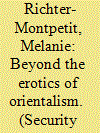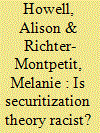|
|
|
Sort Order |
|
|
|
Items / Page
|
|
|
|
|
|
|
| Srl | Item |
| 1 |
ID:
127803


|
|
|
|
|
| Publication |
2014.
|
| Summary/Abstract |
Contrary to commonsense understandings of torture as a form of information-gathering, confessions elicited through the use of torture produce notoriously unreliable data, and most interrogation experts oppose it as a result. With a focus on the US carceral regime in the War on Terror, this article explores the social relations and structures of feelings that make torture and other seemingly ineffective and absurd carceral practices possible and desirable as technologies of security. While much of international relations scholarship has focused on the ways in which affective and material economies of Orientalism are central to representations of the 'terrorist' threat, this article connects the carceral violences in the racialized lawfare against Muslimified people and spaces to the capture and enslavement of Africans and the concomitant production of the figure of the Black body as the site of enslaveability and openness to gratuitous violence. The article further explores how these carceral security practices are not simply rooted in racial-sexual logics of Blackness, but themselves constitute key sites and technologies of gendered and sexualized race-making in this era of 'post-racial triumph' (HoSang and LaBennett, 2012: 5).
|
|
|
|
|
|
|
|
|
|
|
|
|
|
|
|
| 2 |
ID:
157596


|
|
|
|
|
| Summary/Abstract |
Queer International Relations’ momentum in the past four years has made it inconceivable for disciplinary IR to make it ‘appear as if there is no Queer International Theory’. The ‘queer turn’ has given rise to vibrant research programmes across IR subfields. Queer research is not only not a frivolous distraction from the ‘hard’ issues of IR, but queer analytics crack open for investigation fundamental dimensions of international politics that have hitherto been missed, misunderstood or trivialised by mainstream and critical approaches to IR. As queer research is making significant inroads into IR theorising, a fault line has emerged in IR scholarship on sexuality and queerness. Reflecting the tensions between Lesbian, Gay, Bisexual and Transgender (LGBT) Studies and Queer Theory in the academy more broadly, the IR literature on (homo)sexuality largely coalesces into two distinct approaches: LGBT and Queer approaches. The article will lay out the basic tenets of Queer Theory and discuss how it diverges from LGBT Studies. The article then turns to the books under review and focuses on the ways in which they take up the most prominent issue in contemporary debates in Queer Theory: the increasing inclusion of LGBT people into international human rights regimes and liberal states and markets. The article finishes with a brief reflection on citation practices, queer methodologies and the ethics of queer research.
|
|
|
|
|
|
|
|
|
|
|
|
|
|
|
|
| 3 |
ID:
173879


|
|
|
|
|
| Summary/Abstract |
This article provides the first excavation of the foundational role of racist thought in securitization theory. We demonstrate that Copenhagen School securitization theory is structured not only by Eurocentrism but also by civilizationism, methodological whiteness, and antiblack racism. Classic securitization theory advances a conceptualization of ‘normal politics’ as reasoned, civilized dialogue, and securitization as a potential regression into a racially coded uncivilized ‘state of nature’. It justifies this through a civilizationist history of the world that privileges Europe as the apex of civilized ‘desecuritization’, sanitizing its violent (settler-) colonial projects and the racial violence of normal liberal politics. It then constructs a methodologically and normatively white framework that uses speech act theory to locate ‘progress’ towards normal politics and desecuritization in Europe, making becoming like Europe a moral imperative. Using ostensibly neutral terms, securitization theory prioritizes order over justice, positioning the securitization theorist as the defender of (white) ‘civilized politics’ against (racialized) ‘primal anarchy’. Antiblackness is a crucial building-block in this conceptual edifice: securitization theory finds ‘primal anarchy’ especially in ‘Africa’, casting it as an irrationally oversecuritized foil to ‘civilized politics’. We conclude by discussing whether the theory, or even just the concept of securitization, can be recuperated from these racist foundations.
|
|
|
|
|
|
|
|
|
|
|
|
|
|
|
|
| 4 |
ID:
164643


|
|
|
|
|
| Summary/Abstract |
This article argues that while Foucauldian security studies (FSS) scholarship on the biopolitics of security and liberal war has not ignored racism, these works largely replicate Foucault's whitewashing of the raciality and coloniality of modern power and violence. Drawing on Black, indigenous, postcolonial and decolonial studies, we show how Foucault's genealogy of biopower rests on an unspecified concept of the “human,” failing to account for how notions of “human” were constituted through the savage and slave other, how enslaved people were rendered into things, and how punitive, sovereign violence persists as a (settler) colonial technique of gratuitous, not merely instrumental, violence. FSS exacerbates these problems. This article challenges two core FSS propositions on liberal war: 1. that “human life cannot ever be secured,” which replicates Foucault's Eurocentric reliance on an unspecified “human” as the object of biopolitics; 2. that “everyone is (potentially) dangerous” and thus open to the punitive/lethal dimensions of liberal power, which reduces racism to a sorting process after the establishment of biopolitics and liberal war, rather than a precondition of it. This “methodological Whiteness” (Bhambra 2017a) results in major oversights in FSS empirical genealogies of: state violence, twenty-first-century digital and molecular revolutions, labor, capital, and enslavement.
|
|
|
|
|
|
|
|
|
|
|
|
|
|
|
|
| 5 |
ID:
192988


|
|
|
|
|
| Summary/Abstract |
This article examines the #SdScandal: the backroom and public fracas surrounding an article on epistemic racism in classic securitization theory that we authored. It argues that what the #SdScandal illustrates is that disciplinary whiteness in international relations has been upheld not despite, but in part through, the ‘critical turn’. Using textual analysis as well as cyber-ethnographic and auto-ethnographic methods, it details how post-positivist knowledge-frames sometimes become vehicles for the rehabilitation of racial-colonial concepts, and how white femininities and novel tender masculinities can be evoked in the defence of institutional hierarchies. That such gendered shifts in disciplinary whiteness (seem to) depart from old-guard ‘white man’s IR’ (per Lake, 2016) only increases their efficacy in securing the status quo. The article further contextualizes this argument about international relations within the broad backlash against resurgent claims for racial justice both inside and outside the academy. It identifies political-intellectual convergences, not only between orthodox and some critical thought, but between right-wing and some self-identified liberal, leftist and/or feminist scholars, especially around the supposed threat of ‘cancellation’ of scholars and scholarship. Examining what critics of the #SdScandal called threats of retribution against this journal, it argues that at stake are issues of editorial independence and academic freedom, and, more broadly, contending visions of how to pursue anti-racism.
|
|
|
|
|
|
|
|
|
|
|
|
|
|
|
|
|
|
|
|
|